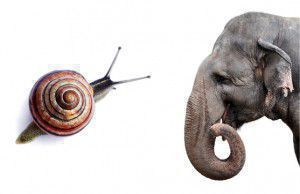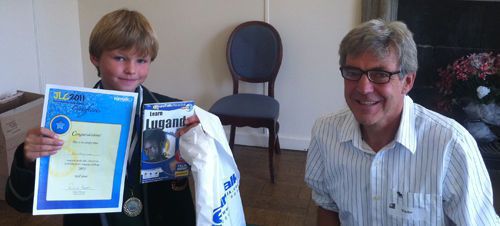8 common language mistakes to avoid [infographic]
When you’re learning a new language, it’s easy to make mistakes. And that’s ok; it’s the best way to learn. But sometimes you might think you know what you’re saying, and actually you’ve said something very different. Here are a few examples to look out for…
Please let us know your own examples and as always, do feel free to share the infographic with others.
Infographic created by Adam (research) and Luke (design)
Embed This Image On Your Site (copy code below):
Languages for the future: the top ten
A recent report by the British Council has laid out the ten most important languages for the UK’s future, in political, economic, educational and cultural terms.
According to the report, the ten most important languages, in order, are: Spanish, Arabic, French, Mandarin, German, Portuguese, Italian, Russian, Turkish and Japanese. I read this list with a certain amount of smugness that I speak Spanish, German and French – although my knowledge of key languages such as Mandarin and Arabic is, sadly, next to nothing. So feel free to give yourself a pat on the back if you can speak, or are learning, one of those ten languages.
 Unfortunately, the report also indicated that the numbers of UK residents actually learning these languages, especially the ones not taught in schools, are very low. On a positive note, around 15% of people can hold a conversation in French. However, only 6% are able to do so in German, 4% in Spanish and 2% in Italian. But the figures for the other languages are as low as 1%.
Unfortunately, the report also indicated that the numbers of UK residents actually learning these languages, especially the ones not taught in schools, are very low. On a positive note, around 15% of people can hold a conversation in French. However, only 6% are able to do so in German, 4% in Spanish and 2% in Italian. But the figures for the other languages are as low as 1%.
Perhaps one of the problems is that Mandarin, Japanese, Russian and Arabic all require learners to pick up another script. This might seem daunting, but is actually really exciting. Just being able to read simple words in another script gives you a huge sense of achievement, and you’d be surprised how quickly you can begin to decipher words from what previously looked like squiggles.
Hopefully if you’re reading our blog you already know the importance of language-learning, and that picking up a new language is an adventure rather than a chore! But maybe this list will give you an idea about which language you fancy picking up – maybe it’s time to start reviving your A-level French? Or be brave and give Arabic a try? Personally, I’m working on adding Italian to my list, which is proving interesting as I lapse back into Spanish as soon as I don’t know a word!
The report recommends a much greater focus on languages in schools and that businesses should invest in language training for languages that are useful in their industry. But don’t worry if your school days are behind you – it’s never too late to learn a new language!
Alex
Where it’s at – how to say @ in different languages
The other day a colleague was telling someone his email address in French. He was halfway through and ran across a problem. He didn’t know the word for “the little ‘a’ in the circle”. In English we just say ‘at’, but that translates as ‘à’ in French and that sounds remarkably like the letter ‘a’. See the problem?
What he should have said was ‘arobase’, but different cultures call it completely different things – from official names to animal-based nicknames. Below we’ve found some of the most creative words for “the little ‘a’ in the circle”:
Animals (With Curly Bits)
The Germans, Romanians and South Africans (among others) all describe it as a ‘monkey tail’.
Thai and Hungarian people call it a ‘worm’ and the Italians refer to it as a ‘snail’.
The Swedish and Danish describe the shape as an ‘elephant’s trunk’ and the Greeks think it looks more like a ‘duckling’.
Curly Food
In Catalan, the “little ‘a’ in the circle” is named after a swirly pastry called an ‘ensaïmada’.
In Hebrew it’s named after a strudel.
In Slovak, it’s named after a rolled pickled herring!
Other Uses
The “little a” isn’t only used in email addresses. In Spanish, the symbol is sometimes used to represent masculine and feminine gender in the same word, for example ‘amig@s’ means male and female friends, although this is frowned upon by the Real Academia Española, so we don’t recommend it!
And in Portugal and Brazil, the symbol is used in text messages to represent ‘french kiss’ – so be careful how you use it if you’re travelling in those countries…
What do you call the @ symbol?
Lost in translation: making sense of maths
Reading Nat’s post about all the fascinating linguistic differences and difficulties that she and her translators experienced when translating the new uTalk app, I was reminded of some of the similar issues we’ve had in localising the maths apps. What seems totally normal to a three-year-old in the UK might not be all that familiar to a kid in Malawi, for a start! Not to mention the fact that (unfortunately for us English speakers), not all languages follow our grammar rules. Here are a few of the cultural and language localisation issues we’ve come across recently…
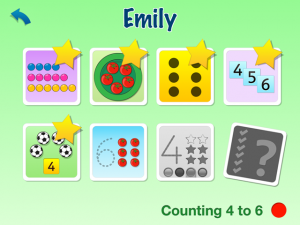 In Swedish, there were a couple of interesting language differences, for example: you cannot use the same word for ‘height’ in Swedish for an object such as a house as for a person (Välj det Längsta barnet – choose the tallest child, but Välj det högsta trädet – the tallest tree), whereas in English we can say short or tall regardless of the object.
In Swedish, there were a couple of interesting language differences, for example: you cannot use the same word for ‘height’ in Swedish for an object such as a house as for a person (Välj det Längsta barnet – choose the tallest child, but Välj det högsta trädet – the tallest tree), whereas in English we can say short or tall regardless of the object.
In Malawi, some of the ‘everyday’ objects featured in the apps probably seemed more than a little strange. In fact, Chichewa is strongly based on words for things that people see and encounter in daily life. Our translator had to get a bit creative and come up with ‘equivalent’ names for objects such as a robot (a doll in the Chichewa version), a turnip (a potato in the app), a dragon (she had to use a description meaning ‘a fierce animal’) or a fridge (replaced by a cupboard). There are also many more ‘technical’ words which don’t exist in traditional Chichewa, such as shapes. These are therefore normally given English names with a slight Chichewa accent (sikweya, trayango, rekitango and so on).
This is quite similar in Wolof: many items simply do not have a name in Wolof, or the words are unfamilar to most young people. Many items are therefore named in French instead, such as animals (giraffe), shapes (cercle) or fruits (banane). Above about 10, Wolof-speakers also tend to revert to French numbers instead of the more complex Wolof system (similar to the Chichewa – 5 and 1, 5 and 2…).
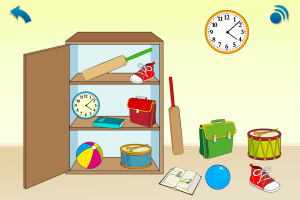 As with the uTalk app, Polish proved an especially problematic language for us too. One of the biggest issues was that in Polish the word for ‘you’ is dependent on gender. The translator mainly dealt with this by saying ‘we’ (e.g. Nauczyliśmy się/robiliśmy – we learned/were learning how to…), rather than addressing the child playing the app as male or female. It is also not usual to use prepositions such as ‘inside’ and ‘outside’ when describing the location of an object. e.g. instead of saying ‘the book is outside the cupboard’, Poles would normally say ‘the book is not in the cupboard’. Similarly to many other languages, some of the objects were also not very familiar: a cricket bat is not a well-known object, so it was translated as kijek – a little bat, and mangoes were translated as owoce – a fruit, as mangoes are not a ‘usual’ fruit in Poland – the same was the case with the Hungarian app, where we translated mango as gyumolc – also a generic word for fruit.
As with the uTalk app, Polish proved an especially problematic language for us too. One of the biggest issues was that in Polish the word for ‘you’ is dependent on gender. The translator mainly dealt with this by saying ‘we’ (e.g. Nauczyliśmy się/robiliśmy – we learned/were learning how to…), rather than addressing the child playing the app as male or female. It is also not usual to use prepositions such as ‘inside’ and ‘outside’ when describing the location of an object. e.g. instead of saying ‘the book is outside the cupboard’, Poles would normally say ‘the book is not in the cupboard’. Similarly to many other languages, some of the objects were also not very familiar: a cricket bat is not a well-known object, so it was translated as kijek – a little bat, and mangoes were translated as owoce – a fruit, as mangoes are not a ‘usual’ fruit in Poland – the same was the case with the Hungarian app, where we translated mango as gyumolc – also a generic word for fruit.
In Portuguese, there is no real way to distinguish between ‘more’ and ‘most’ or ‘less’ and ‘least’. Mais means both more and most, and menos less/least/fewer/fewest. This is also the case in Welsh: ‘bigger’ and ‘biggest’ translate to mwy and mwyaf respectively, but ‘more’ and ‘most’ also translate to mwy and mwyaf. The same goes for ‘smaller’/’smallest’ and ‘less’/’least’ (llai, lleiaf). On the other hand, there are different words for top and bottom shelves. Generally ‘top’ and ‘bottom’ are top and gwaelod but ‘top shelf’ and ‘bottom shelf’ are silff uchaf and silff usaf.
I was also intrigued to find out that in Amharic (an African language spoken in Ethiopia), they have a completely different system for telling the time: ‘1 o’clock’ does not mean lunch time, it in fact means ‘the first hour of the day’, i.e. when the sun comes up, and the rest of the day is counted from there. In fact, “Telling the time’ has been one of the hardest topics to localise, as our ideas of what happens at what time are not exactly international. Our French translator not only found the idea of eating a boiled egg for breakfast rather funny, but also pointed out that schools finish at 5 in France, not 3 as in the app, and a child would eat dinner at 7 or 8, not at 5 or 6! In Spain this is even funnier, as Spanish children regularly eat their dinner at 9 p.m., and go to sleep at 10 p.m. or perhaps later at the weekend or on holiday.
These are just a few of the language and cultural issues we’ve encountered on the maths translation project, and there are sure to be more! We have 10+ new languages ready to be released, and many more in the pipeline, so watch this space!
Alex
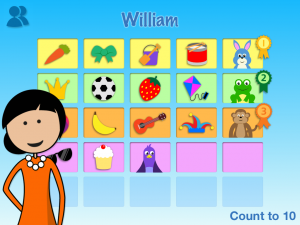 The maths apps are available from the App Store: Maths, age 3-5 and Maths, age 4-6.
The maths apps are available from the App Store: Maths, age 3-5 and Maths, age 4-6.
And also now available (in English only for the time being), Counting to 10, our first maths practice app, is on sale in the iTunes App Store for iPhone, iPod touch and iPad, and Google Play, for Android devices.
Sorry Mickey! Dedicated Ben chooses JLC over Disneyworld
Nine year old Ben Fawcett will be cutting short his family holiday in Disneyworld to take part in this month’s Junior Language Challenge final.
Ben, who is the first pupil from Oakwood School near Chichester to get through to the final, had been due to be in Florida when the final of EuroTalk’s JLC takes place on October 21st.
His mum, Anna, says: “The timing couldn’t have been worse for us. We’re taking the children to Disneyworld for two weeks but Ben and I are only going for one week because the final is in the middle of our planned holiday.
“He’s disappointed but we gave him the choice and he said, ‘No Mummy, I’ve come this far – I want to do it,’ and I’m happy to fly back with him. But the timing couldn’t have been worse. We arrive back the day before the competition so he’ll probably be jet-lagged…”
Holiday plans apart, entering the competition has been a good thing for the Fawcetts.
Anna adds: “Children from Oakwood have made it through to the semi-finals before but not to the finals so Ben’s as proud as a peacock! It’s been really good for his confidence not just with languages but generally. He’s thoroughly enjoyed the competition and I’ve hardly had to remind him to look at the games.”
Having picked up some of the basics of Portuguese and Kazakh in the first two rounds of the competition, Ben is now one of around 40 finalists trying to get to grips with the last JLC language, Luganda.
Anna adds: “I’m obviously extremely proud of him but it’s completely nerve-wracking as well!”
We’re looking forward to seeing Ben and Anna at the final, which will be held at the Language Show next Friday.
Ben’s even made the local paper!
Are there any other semi-finalists out there who’d like to share their JLC story?

